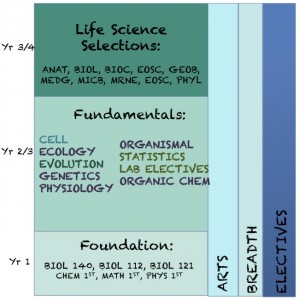UBC’s Biology Program was recently restructured to allow students more flexibility in pursuing specific interests, such as sustainability, while working toward their BSc degree.
The UBC Biology Undergraduate Program is the largest of the undergraduate science programs offered at UBC. In first year science, undergraduates interested in the Life Sciences take some or all of the first year Biology courses (which are offered jointly by the Departments of Botany, Zoology, and Microbiology & Immunology). These are large courses with enrollments of between 1,500 and 2,000 students. Students apply to a Majors program in 2nd year and may choose among programs in Biochemistry, Biology, Biotechnology, Physiology (Honours only), Environmental Science, Microbiology and Immunology, Pharmacology, and Psychology, as well as various interdisciplinary majors such as Integrated Sciences, the Combined Majors in Science, and the Major in Cognitive Systems. Roughly 300 to 400 choose the Biology Program.
The Biology Program consists of a majors program and multiple honours specializations. In addition, the Biology Program partners with other units on campus to offer a combined major in Computer Science & Biology, and combined Honours Programs in Chemical Biology, Computer Science & Biology, and Biology & Oceanography as well as double majors and minors. Cooperative education and international study exchange options that provide relevant work experience are also available within the biology major. Students typically apply to enter the honours programs, co-op, and exchange programs in their 3rd year.
Biology Major Program Overview:

Over the past decade, the Biology Program has undergone significant change in both curriculum and pedagogical approach. The current program structure is relatively recent, with the new program being fully implemented for the first time in the 2011-2012 academic year. This program revision is the result of a lengthy process of reflection and consultation (starting in 2001) that involved input from the Faculty of Science, the Departments of Zoology, Botany, and Microbiology & Immunology, and from undergraduate students. Significant new funding for this initiative came from the Dean’s Office via Strategic Project Funding (SPF) and from the Carl Weiman Science Education Initiative (CWSEI). The former provided new, recurring resources for instructor and teaching assistant hires as well as funds for enhancing experiential learning within the curriculum. The latter provided funding for postdoctoral fellows (science teaching and learning fellows, (STLFs)) to develop and test new educational approaches within the primary discipline streams of our majors program. This includes mapping the program level learning outcomes onto our courses, with the goal of identifying gaps and overlaps; mapping experiential learning and writing skills development through the program; and facilitating professional development for faculty teaching in the Biology Program.
The Biology Program provides access to a wide diversity of courses, and currently offers 87 BIOL courses; the Department of Zoology offers or participates in 67 of these courses. In addition, Biology undergraduate students have access to more than 50 courses that can count towards their Biology degree that are offered through other programs or units (Biochemistry, Microbiology, Physiology, Anatomy, Bamfield Marine Sciences Center, Earth and Ocean Sciences, as well as faculties other than Science). Together this broad course selection allows students access to an impressive variety of courses across the complete breadth of the Biological Sciences.
In the new biology specialization, we are developing pathways to guide students through their undergraduate degree, not only in preparation for careers or continued study, but also as informed global citizens. While students can select courses within biology to follow a number of these pathways, a sustainability option goes beyond biology course offerings. Coordination and collaboration with other departments and faculties is necessary to help students build interdisciplinary competencies and provide them balanced coverage of sustainability concepts, skills, and values.

